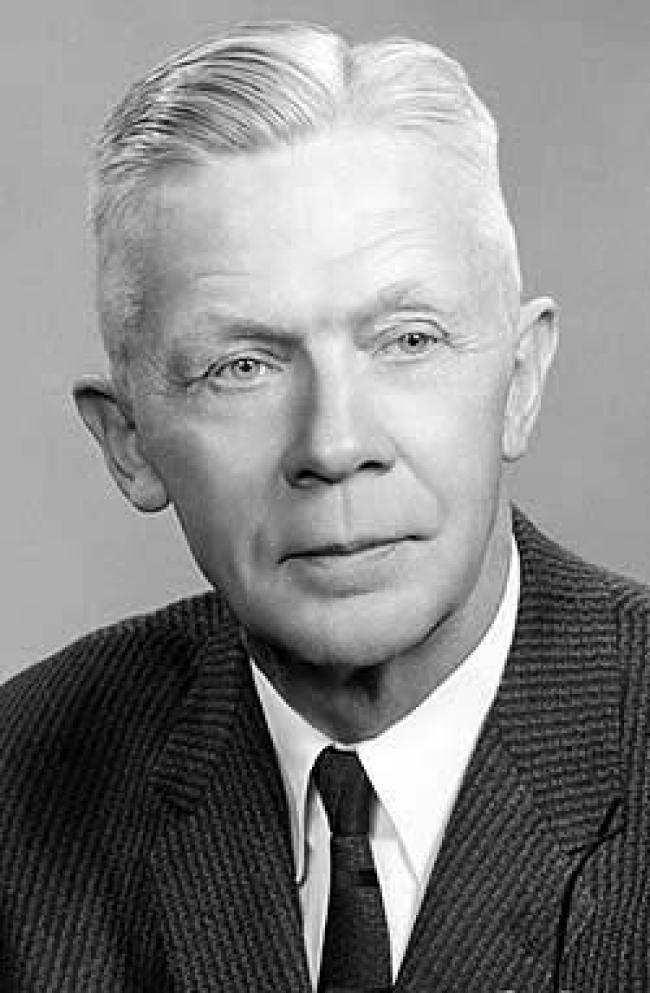Conrad John Immanuel Bergendoff (1895-1997)
Fifth President of Augustana College, 1935-1962

Born in 1895 in rural Shickley, Neb., to Swedish-American parents, Conrad John Immanuel Bergendoff grew up in Middletown, Conn. Here, two cultures shaped the boy and perhaps prepared for the man's inclusive vision. At home and in his minister father's parish, Swedish language and customs predominated. In public schools, he received an excellent American education among classmates whose diverse backgrounds he appreciated.
He graduated from Augustana College at age 19, earned his master's degree at the University of Pennsylvania, and a divinity degree from Augustana Seminary, and studied at major universities both in the United States and abroad: Chicago (where he received his doctorate in church history), Columbia, Uppsala, Lund, Oxford, and Berlin.
Like his father, Bergendoff began his career in the ministry, serving parishes in Chicago and New York City before returning to Augustana, first as dean of the Seminary and then as president of the college and seminary. Bergendoff brought with him an ecumenical ideal shaped by close association with Swedish archbishop Nathan Söderblom, pioneering architect of the World Council of Churches. Serving as Söderblom's hand-picked secretary, Bergendoff was deeply moved by the archbishop's passion for unity among various Christian denominations. Bergendoff strove, often against strong opposition, to make this ideal a reality.
Similarly, Bergendoff sought to bring together the intellectual and the spiritual in education. Conceiving knowledge as a perfect whole, he believed each academic discipline contributed its essential part. Both science and spirituality must be studied, he asserted, or education is incomplete.
Although Bergendoff saw the association of college and seminary as a natural one, the Synod in 1948 voted to sever the historic ties between Augustana College and the Theological Seminary. Although disappointed at the decision, Bergendoff, having chosen the presidency of Augustana College, dedicated himself to building the excellence of the school.
World War II tested curricular resources as new technological training jostled for place beside liberal arts courses. In 1947, veterans returning under the G.I. Bill® pushed enrollment to a then all-time high of 1,635. Classes were crowded, resources strained, and Augustana lost its homogeneity; diversity challenged and nourished the school.
By 1955, Augustana had increased its endowment from $923,018 to $2,500,000 and boasted new facilities, including a men's dormitory, library, and fine arts complex. Enrollment had grown from 511 to 1,100; to serve these students Bergendoff sought to build a roster of excellent scholar/teachers. Phi Beta Kappa granted the college a chapter in 1949, the American Chemical Society accredited Augustana in 1955, and the Augustana Choir appeared on national television in 1952.
Bergendoff was above all an ecumenicist. During his 27-year tenure, first as president of Augustana College and Theological Seminary, then as president of Augustana College alone, he worked to realize his vision of wholeness for the church and for collegiate education alike. Long after his retirement Bergendoff remained a significant presence in the Quad Cities community, retaining the discipline, dignity, and grace that had defined his presidency, as well as an energetic openness to the forces that unify life.
GI Bill® is a registered trademark of the U.S. Department of Veterans Affairs (VA). More information about education benefits offered by VA is available at the official U.S. government Web site at https://www.benefits.va.gov/gibill.
